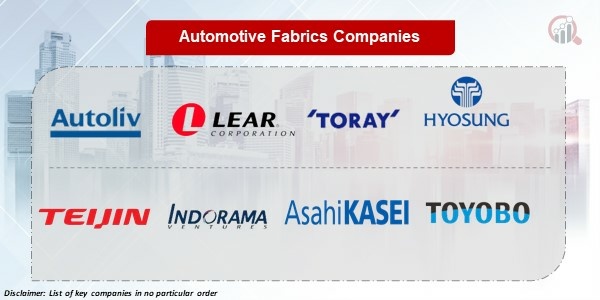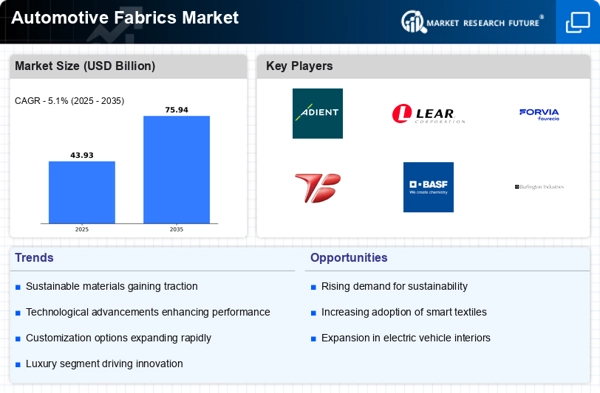Top Industry Leaders in the Automotive Fabrics Market

Automotive Fabrics Market
The Automotive Fabrics Market involves the production and supply of textiles used in vehicle interiors, including seat covers, headliners, and carpets. This market is driven by consumer demand for comfort, aesthetics, and durability in automotive interiors. Environmental concerns are also pushing the market towards sustainable and recyclable materials. Key trends include the integration of smart fabrics with functionalities such as heating, cooling, and connectivity.
Competitive Strategies:
In this dynamic market, key players are adopting various strategies to gain a competitive edge:
-
Product Innovation: Leading companies are actively developing new fabric blends, textures, and functionalities to cater to diverse customer preferences. For example, in December 2023, Lear Corporation introduced its "Sensonic" seating platform, featuring a unique combination of comfort and noise reduction properties -
Strategic Acquisitions: Mergers and acquisitions are a common strategy to expand product portfolios and geographical reach. In February 2024, Adient, a major automotive seating supplier, announced the acquisition of Futuris, a leading producer of interior trim components, aiming to strengthen its position in the market -
Focus on Lightweight Materials: The automotive industry's push for fuel efficiency is driving the demand for lightweight fabrics that reduce vehicle weight. In March 2024, Saxony Automotive, a German supplier, showcased its new range of lightweight seat fabrics made from recycled materials -
Sustainability Initiatives: Several manufacturers are integrating sustainable practices throughout their supply chains. In April 2024, Asahi Kasei, a Japanese chemical company, announced its plans to increase the production capacity of its bio-based fabrics for automotive applications
Factors Influencing Market Share:
Several factors determine a company's market share in this competitive landscape:
-
Product Portfolio: Offering a diverse range of fabrics catering to various vehicle segments (luxury, budget, commercial) and functionalities (seating, carpeting, headliners) is crucial. -
Manufacturing Capabilities: Strong production infrastructure, including efficient operations and a global presence, allows companies to meet the demands of major automakers. -
Cost Competitiveness: Balancing innovation with affordability is essential, especially for high-volume car manufacturers. -
Customer Relationships: Building strong partnerships with automakers ensures consistent supply contracts and early access to new vehicle platforms.
Key Companies in the Automotive Fabrics market include
- Autoliv Inc, (Sweden)
- Lear Corporation (US)
- Toray Industries (Tokyo)
- Hyosung Corporation (South Korea)
- Teijin Limited (Japan)
- Indorama Ventures Public Company (Thailand)
- Asahi Kasei Corporation (Japan)
- Toyobo Co., Ltd (Japan)
- Toyota Boshoku Corporation (Japan)
- SEIREN Co. Ltd. (Japan)
- Suminoe Textile Co., Ltd. (Japan)
Recent News
April 2024: A major win for eco-conscious consumers! Leading car manufacturers announced a significant increase in the use of sustainable materials like recycled polyester and plant-based fabrics for car interiors. This shift is driven by rising consumer demand for environmentally friendly vehicles and stricter regulations on emissions. Analysts predict this trend will further propel the growth of the sustainable automotive fabrics market.
March 2024: With the electric vehicle (EV) market booming, there's a growing need for lightweight fabrics. Lighter car interiors translate to improved battery range. Several automotive fabric suppliers showcased innovative lightweight materials with exceptional comfort and durability at the recent Automotive Interiors Expo. This trend indicates a potential shift in the industry towards lighter fabrics specifically designed for EVs.
February 2024: The luxury car segment continues to be a bright spot for the automotive fabrics market. A recent report highlights the increasing demand for premium fabrics like leather and Alcantara in high-end vehicles. This trend is likely to be sustained due to the growing emphasis on personalized luxury experiences for car buyers.










